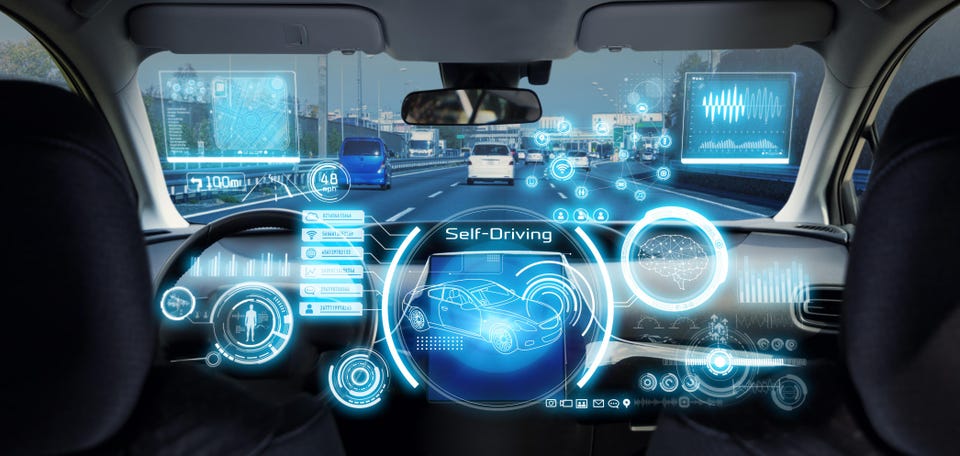Consumer Tech Self-Driving Startups Have Lost $40 Billion In Stock Market Valuation In 2 Years John Koetsier Senior Contributor Opinions expressed by Forbes Contributors are their own. John Koetsier is a journalist, analyst, author, and speaker. Following New! Follow this author to stay notified about their latest stories.
Got it! Oct 17, 2022, 03:16pm EDT | New! Click on the conversation bubble to join the conversation Got it! Share to Facebook Share to Twitter Share to Linkedin Cockpit of futuristic autonomous car. getty Self-driving car and truck startups have lost a combined $40 billion in stock market valuation over the last two years, according to an analysis by Crunchbase, which keeps tabs on startup valuations. Overall, the cohort of autonomous vehicle startups that Crunchbase tracked has declined 81% in value, from just over $51 billion when each debuted on the stock market to a current book value of just $9.
16 billion. That includes spectacular flame-outs like Quanergy Systems, a solid-state sensor company down 99% since IPO, Otomo, a cloud-based car connection solution that is down 97%, and Embark Technologies, a self-driving truck technology startup that is also down 97%. What’s causing the downturn? “It appears investors have mostly given up,” Crunchbase analyst Joanna Glasner says.
Self-driving startups have lost 81% of their stock market valuation over the last two years. Crunchbase That’s not too hard to believe, given that in 2019 AI experts promised full self driving vehicles , at least on certain routes. We actually are starting to see that now , so they weren’t necessarily wrong, but the problem is that technology is taking longer than expected to become widely available.
Perhaps more damaging, Elon Musk famously promised full level five self driving technology “this year” way back in 2020. That never happened, and Consumer Reports detailed significant flaws in Tesla’s technology later that year. MORE FOR YOU They Inherited Billions Upon Billions: Meet America’s Richest Heirs Why Did The Van Gogh ‘Sunflowers’ Protest Inspire Such A Hysterical Response? 7 Best Short-Term Investments To Park Cash Few if any of the valuations were built on actual shipping product and real revenues, so Glasner’s explanation makes sense.
Getting the technology to market in volume has been extremely challenging, and investors are not known for their patience. In yet another example, Reuters said Apple was planning to ship a self-driving car by 2024, which seems extremely unlikely at this point. Where we seem to be seeing more innovation is autonomous single-purpose robots , whether they’re delivery drones , warehouse robots, or farm equipment.
The challenges inherent in delivering these bounded technologies, while significant, are much less daunting than the open world of possibilities on our roads. And the bar is set very high for regulators to unleash self-driving cars or autonomous trucks. Essentially, autonomous systems in public need to be better than humans.
“Simply achieving a system that has safety levels on par with a human is actually fairly tractable, in part because human failure modes are somewhat preventable, you know, things like inattention or aggressive driving,” Vlad Voroninski, CEO of autonomous vehicle training company Helm. ai told me in a TechFirst podcast. “But in truth even achieving that level of safety is not sufficient to launch a scalable fleet.
Really what you need is something that’s much safer than a human. It needs to be fully interpretable for liability reasons, highly scalable, [and have] the ability to kind of go into new places very quickly and highly cost effective. And achieving all of these things simultaneously is quite hard.
” That’s taking some time. And investors’ love affair with the space has not lasted, Glasner says. It is important to note that there are some winners in the group, even though almost every company is down from its IPO price.
LIDAR maker Innoviz, while down 53% from its IPO, continues to innovate and has consistently racked up customer after customer. Most recently that includes a $4 billion contract with Volkswagen for millions of its sensors. So there is still innovation, and there’s still a huge amount of value available for startups that achieve product-market fit and find customers.
But it also might be a good time for vehicle manufacturers to look at distressed startups that might be available as aqui-hires, providing technology and personnel to speed up their own autonomous vehicle efforts. Follow me on Twitter or LinkedIn . Check out my website or some of my other work here .
John Koetsier Editorial Standards Print Reprints & Permissions.
From: forbes
URL: https://www.forbes.com/sites/johnkoetsier/2022/10/17/self-driving-startups-have-lost-40-billion-in-stock-market-valuation-in-2-years/
